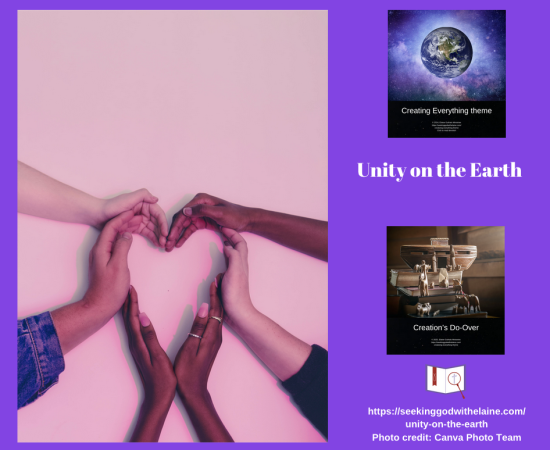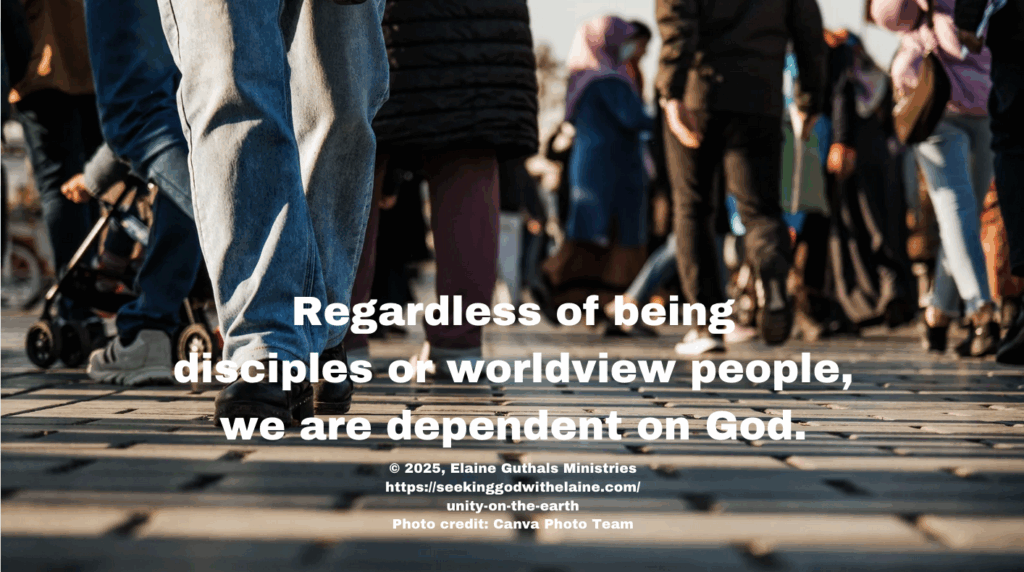Since sin had entered the earth again, it grew until it reached a head at Babylon. This devotional reading looks at setting the scene for the building of the Tower of Babel.
Nuggets
- Originally, all humans spoke the same language.
- Humans started out obeying God’s command to fill the earth.
- They built a tower for worldly purposes.

In the first years after the flood, even though Noah and Ham had sinned, it seemed like everything was going according to God’s plan. Let’s look at what was happening.
Let's Put It into Context
To read devotions in the Creating Everything theme, click the button below.
Devotions in the Creation’s Do-Over series
Let's Put It into Context #2
In Genesis 10, we talked about the descendants of Noah’s three sons, Shem, Ham, and Japheth. At the end of the discussion for each son, a similar verse was repeated. “These were the descendants of Ham, identified by clan, language, territory, and national identity” (Gen. 10: 20 NLT).
Somewhere within the genealogy discussed, the world was divided into groups. Those brief statements will be expanded on in this chapter.
But what is a nation? Murphy seemed to think it was determined by the language the people spoke. I think it was more than that.
Resource
Geography plays a part in determining what is a nation. Borders lead to their identity. Proximity helps to make them a cohesive group.
Also important is the makeup of the group. Do they have a family ties? Is there some other similarity that ties them together (besides language)?
Just a quick note. In this chapter, we are not told where the territory each son was given and how it was chosen what they got. It does appear that they were given specific areas to populate.
Let's Put It into Context #3
We have no idea of how much time transpired between the death of Noah and the building of the tower. Moses didn’t tell us.
That is why I was surprised at what Gray said. He wrote, “For one hundred years the posterity of Noah had continued to increase.”
Resource
The problem I see with that is we aren’t given a starting reference for the countdown. Was it 100 years after they disembarked from the ark? Or 100 years after Noah died?
So, was Noah still alive to see how corrupted the world had become so quickly?
One Language
“At one time all the people of the world spoke the same language and used the same words” (Gen. 11: 1 NLT)
Originally, all humans spoke the same language.
Language is a separate, big conundrum. Many linguists, for years, refused to believe that there was once only one language.
This one-language hypothesis is called Proto-World. It is only within the last decade or so that linguists have accepted that language, in fact, began as one language. There were too many similarities to believe otherwise.
Resource
The oldest written language is said to be the Sumerian language. It originated in ancient Mesopotamia around 3100 BC. The one language has grown to over 5,000.
To put this into context, the Sumerian civilization was a civilization from 3500 to 1750 BC. It occupied land along the banks of the Tigris and Euphrates Rivers, currently the non-desert areas of Iraq.
Vaughan had a different take. He argued that the first language was Hebrew.
Resource
I guess I had never really thought about it. It would seem logical that it was Hebrew instead of the Sumerian language.
But we aren’t give any hint what was the language on which others were developed.
I’m sure part of the problem some had in believing that there was only one language was the sudden appearance of many languages. As complex as languages are, it is easier to think they evolved over time.
But that ignores the fact that God is Sovereign God. He can do the impossible. With God, nothing is impossible.

What would be the purpose of having only one language – besides everyone being able to talk to each other? It promotes unity within God’s Church. Everyone has the same opportunity to hear God’s Word. There are no barriers to their introduction to the Plan of Salvation.
Ooo, baby. Sin messed that up for us, too. We now have not only language barriers but also cultural barriers.
Populating the Earth
“As the people migrated to the east, they found a plain in the land of Babylonia and settled there” (Gen. 11: 2 NLT)
Humans started out obeying God’s command to fill the earth.
If humans were to “… ‘Be fruitful and multiply and fill the earth’” (Gen. 9: 1 ESV), that means they would have to migrate out of the Fertile Crescent. And people were obeying.
We aren’t told here who was migrating, but we can go back to the last chapter to figure that out who they were. “… People would say, ‘This man is like Nimrod, the greatest hunter in the world.’ He built his kingdom in the land of Babylonia, with the cities of Babylon, Erech, Akkad, and Calneh” (Gen. 10: 9-10 NLT).
Nimrod was a descendant of Ham. Remember, Ham — specifically his son Canaan — was cursed for Ham’s sin that stemmed from Noah’s sin. “Then he [Noah] cursed Canaan, the son of Ham: ‘May Canaan be cursed! May he be the lowest of servants to his relatives’” (Gen. 9: 25 NLT).
Babylonians lived in Mesopotamia between 2100 and 538 BC. The city of Babylon was constructed on the Euphrates River.
We know the importance the empire of Babylonia played in the (then) future of the nation of Israel. The Kingdom of Judah was defeated in 586 BC, when the Babylonians destroyed Jerusalem and Solomon’s Temple and exiled many of the Israelites.
Nimrod was also credited with founding Assyria, also. “From there he expanded his territory to Assyria, building the cities of Nineveh, Rehoboth-ir, Calah, and Resen (the great city located between Nineveh and Calah)” (Gen. 10: 11-12 NLT).
Assyria was then northern Mesopotamia. It dated from 2025 to 609 BC. This is currently northern Iraq, southeastern Turkey, and parts of Syria.
But back to Genesis 11.
Yes, they had obeyed the command to populate the earth. No, they hadn’t gone too far at this point. Some did continue to walk with God as they populated the earth.
The real issue here happened when they got settled on the plain of Shinar. They wanted something to “… keep [them] from being scattered all over the world” (Gen. 11: 4 NLT).
It may have started with them deciding they liked the place and didn’t want to move on. But if that happened, they were choosing to disobey God’s directive.
When God commands, we have to say, “Sir, yes sir!”
A Great City with a Tower
“They began saying to each other, ‘Let’s make bricks and harden them with fire.’ (In this region bricks were used instead of stone, and tar was used for mortar.) Then they said, ‘Come, let’s build a great city for ourselves with a tower that reaches into the sky. This will make us famous and keep us from being scattered all over the world’” (Gen. 11: 3-4 NLT)
They built a tower for worldly purposes.
We don’t know how long Nimrod and crew lived on the plain of Shinar until they got fed up with a patriarchal society. They wanted a monarch — an empire.
Think back. Wasn’t that Ham’s sin? He had no respect for his father. He wanted to do and say what he wanted.
This is just that on steroids.
Their problem was they forgot we are not independent of God. Regardless of being disciples or worldview people, we are dependent on God.

What motivated them to build the tower? We get several hints from these verses.
- We can make something substantial.
- We want to build it for ourselves.
- We want it to reach to the sky.
- We want to be famous.
- We don’t want to be scattered.
Fired bricks were invented around 3,000 BC. Sun-dried bricks had been around since approximately 7,500 BC, but these would have been more durable bricks.
Depending on the translation, we are told that Nimrod and his cronies wanted to make a name for themselves. Yeah, that means being famous.
But we have to put it into Hebrew culture to really understand it. A name wasn’t just a moniker that identified Nimrod as opposed to Malachi.
A name in that culture told us who the person was: their character, identity, and destiny.
- Methuselah meant when he dies, it will come.
- Isaac means he laughs.
- Moses means drawn out.
- Yeshua means the Lord is salvation.
I know. We pick names before the kids are born. They didn’t name their kid until Day 8.
They may have gotten an idea of the baby’s character. But they may also give a name as to what role they wanted the kid to play.
I think what they were saying was they wanted a name that established their authority. They were going to take their world in a new direction: away from God.
Well, Nimrod’s name is still known. We don’t know any of his contemporaries, though.
Fame was their goal. But then, they may not have been thinking this long. They probably thought that, after a couple hundred years, no one would remember who they were.
Nimrod and his contemporaries wanted a permanent monument to their glory. They wanted something they built themselves. They wanted their ambition recognized.
The “… with its top in the heavens…” (Gen. 11: 4 ESV) part speaks of idolatry, and we know that the worshiping of false gods came from here. Bradford noted that the practice of worshiping false gods, called the Babylon Mystery Religions, started with Nimrod around the time of the Tower of Babel. That would make sense as Nimrod was the founder of Babylon. They were all finding their footing of being different after the language changed.
Bradford reminded us, even though this worshiping false gods was sinful, from where they came. He wrote,
“Yet, due to mankind’s common point of origin, each of the world’s new religions took with them the common memory of the essential doctrines of the true God who created them …. but they modified and twisted meanings and practices. When you study them closely the world’s false religions are far more similar on the surface than they are unique; they all pretty much look alike.”
Resource
That wasn’t the unity that God wanted. God doesn’t want us unified doing the devil’s work.

How were these men unified? They had to have an intelligence to build what they built. (We don’t know how far they got. It sounds like they were almost done.)
With that intelligence, they probably thought they had power. But the power was just a delusion brought upon by their scheming. That wasn’t ever going to work.
Not with the all-powerful, all-knowing Sovereign God.
We see it in get-rich-quick schemes. People think they can do certain things and have a big payoff.
That doesn’t work because we are relying on ourselves, not God, to provide for us. They were going for self-preservation.
Since the group had decided not to move on to repopulate the earth, they sought to build a tower. They thought that would ensure that they wouldn’t be forced to move again.
Goulburn thought there was another motive. He wrote, “A remembrance of the deluge, and a guilty dread of some similar judgment, leading them to draw close to each other for support.”
Resource
I can see that. Worldview people don’t want to be judged for disobedience to God’s laws and commandments.
The Tower of Babel has been described as a ziggurat. This was supposed to be a rectangular stepped tower. It usually had a temple on top.
We have to realize that God’s Will is going to be done. He will make it so.
They built it so they would not be scattered. Gray argued that this stunted the population growth. He felt the population would increase faster in new counties.
Resource
I guess I can see that. Families of the past were bigger because more were needed to help the family survive. If they had become more dependent on the community as a whole, they may have not seen the need for population growth.
So, they were breaking both parts of God’s command. They were not only not going forth, but they were not also multiplying.
Ooo, baby. They were taking their eternal life into their hands by disobeying God.
They weren’t going to change God’s mind about what would or wouldn’t happen. They were breaking their part of Noah’s covenant. Their part was obedience.
Making the Connections #1
I wonder what it was like to have the world that unified. We certainly aren’t today.
Look at what Vaughan said about what we must go through before we get that Unity back. He wrote,
“Generations must pass; new eras must unfold; Christ must come down and suffer; the Holy Spirit dwell amongst us; the Church must live and work; missionaries must preach; martyrs must die; the whole earth must be regenerate before men could hear their own, their higher, their destined unity.
Resource
No, it hasn’t been and won’t be an easy road back to that unity. But one day it will be achieved.
- “Therefore, God elevated him to the place of highest honor and gave him the name above all other names, that at the name of Jesus every knee should bow, in heaven and on earth and under the earth, and every tongue declare that Jesus Christ is Lord, to the glory of God the Father” (Phil. 2: 11 NLT).
- “For the Scriptures say, ‘As surely as I live,’ says the Lord, ‘every knee will bend to me, and every tongue will declare allegiance to God” (Rom. 14: 11 NLT).
- “I have sworn by my own name; I have spoken the truth, and I will never go back on my word: Every knee will bend to me, and every tongue will declare allegiance to me” (Isa. 45: 23 NLT).
I know. Sometimes we scratch our heads wondering why we have to go through all this to get there.
It is God’s way to show us — and the angels — how much He loves us.
Making the Connections #2
Hmmm. Read what Vaughan said. He wrote, “And even if there were a language perfectly the same, yet until there was a setting to rights of disorders which have come into human thought, and until minds were themselves set in one accord, there could not be unity.”
Resource
Even if it was still just one language, sin would have corrupted it. It would have corrupted our hearts and minds, corrupting the ideas and observations we have.
So, once the original sin was committed, the language itself took a back burner because language just conveys our beliefs.
The words themselves are not as important as the beliefs, ideas, and observation. Worship was negatively impacted.
Making the Connections #3
Leale tried to connect the dots as to why the world of Nimrod brought the creation do-over back to corruption.
- Noah sinned by becoming drunk, a sin of sensual indulgence.
- Ham sinned by gossiping about Noah, a sin of dishonoring his parent.
- Nimrod and his contemporaries sinned by being ambitious, rejecting their dependence on God.
Every sin is against God but look at it this way.
Noah used a prop – the wine – in his sin. He may or may not have chosen to get drunk, but he did. Some may not see that as a sin against God.
Ham chose to not show his father love. He may have thought he was sinning against Noah, but not against God. But his sin was a choice.
Nimrod chose to sin, and he chose to sin against God.
Look what Leale said. He wrote,
“They held that the individual must be sacrificed to the outward grandeur of the State. This is the genius of all Babel-building, to make the city supreme, and to sink the individual. All must be sacrificed to one idea: the nation — State — Constitution. It is not within the province of worldly ambition to recognize the sublime importance of the individual soul.”
Resource
God will protect Himself and His government. To do this, He wrecks men’s plans.
How Do We Apply This?
- Remember that we are not independent of God, rather we are totally dependent on Him.
- Recognize that God can and will turn His wrath on our disobedience.
- Live and work according to God’s Will for us.
- Have glorifying God the main goal for our lives.
Resource
Father God. You want us to be unified but unified under You. You want us all working together to grow in You and to expand Your kingdom. Help us to be obedient to You. Amen.
What do you think?
Leave me a comment below (about this or anything else) or head over to my Facebook group for some interactive discussion.
If you don’t understand something and would like further clarification, please contact me.
If you have not signed up for the email providing the link to the devotions and the newsletter, do so below.
If God has used this devotion to speak with you, consider sharing it on social media.